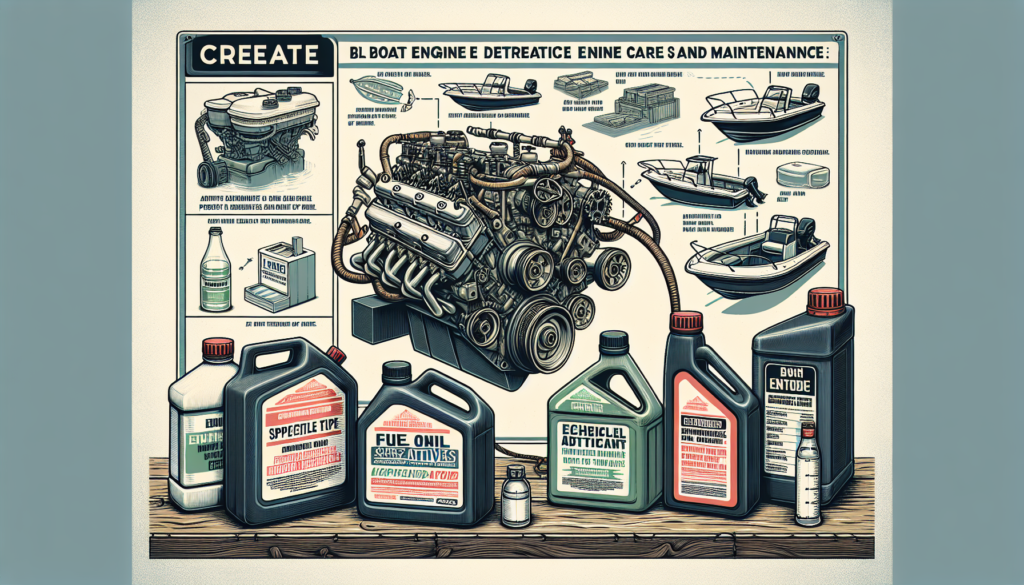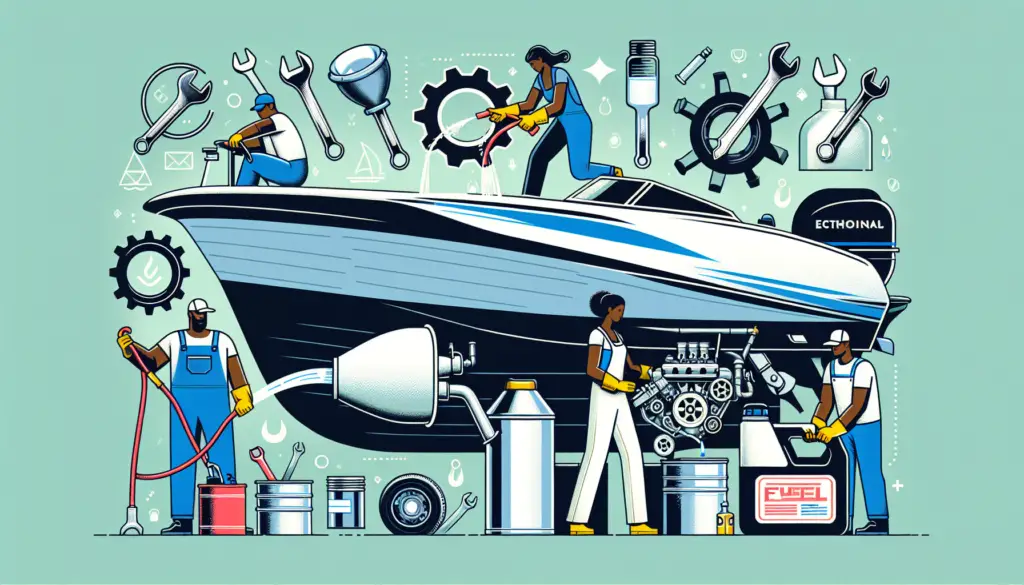You’re a proud boat owner, and naturally, you’d want nothing less than the best performance from your boat engine. “Top Ways to Avoid Ethanol-Related Damage to Your Boat Engine,” is an insightful article providing practical steps to prevent ethanol-induced damage. Providing knowledge on the subject, the article imparts numerous proven approaches for maintaining your engine’s efficiency while keeping it safe from harm. As you navigate through each point, you’ll discover valuable details explaining why each recommendation holds significant value to your boat engine’s health and longevity.

Understanding Ethanol in Fuels
Getting to understand what Ethanol is and its use in fuels is a great start in knowing how to prevent any potential damage to your boat engine.
Definition of Ethanol
Ethanol, also known as ethyl alcohol or grain alcohol, is a colorless and flammable liquid which is usually derived from corn, sugarcane, or other grain products. It is most commonly used in fuels and in the production of a variety of household and industrial products.
Common Sources of Ethanol
As mentioned, ethanol is often derived from corn, sugarcane, and other grains. It is made by fermenting and distilling these plants. In the United States, the primary source of ethanol is corn, while in Brazil, sugarcane is the main source.
How Ethanol is Used in Fuels
In the fuel industry, ethanol is mixed with gasoline to create a blended fuel. The most common blend is known as E10, which contains 10% ethanol and 90% gasoline. Ethanol is added to gasoline to reduce carbon monoxide and other smog-causing emissions, and to help boost octane.
Risks of Ethanol in Fuels
Despite its benefits, ethanol also has its drawbacks. It can cause problems in some engines by contributing to the corrosion of metal parts, deteriorating rubber and plastic components, and attracting water, which can cause phase separation in the fuel.
The Effects of Ethanol on Boat Engines
It’s important to take note of how ethanol affects boat engines specifically as they are more commonly impacted due to being regularly exposed to moisture environments.
Corrosion and Ethanol
With boat engines, one of the most common problems caused by ethanol is corrosion. Ethanol’s affinity for water can lead to increased moisture in the fuel system, leading to the corrosion of metal parts.
Ethanol and Fuel System Parts
Ethanol can also lead to the deterioration of rubber and plastic components in the fuel system. This, in turn, can lead to leaks and engine damage.
Ethanol’s Impact on Engine Performance
Ethanol can negatively affect the performance of your boat’s engine. Its lower energy content than gasoline means that it provides less power. It can also lead to the engine running hotter, which can in turn lead to wear and tear.
Ethanol and Water Contamination
Ethanol can absorb water from the air. In a marine environment, this issue worsens. If it absorbs too much, phase separation can occur, causing the water and ethanol to separate from the gasoline and sink to the bottom of the tank, where the engine’s fuel pick-up is likely to suck it up.
How Ethanol Contributes to Engine Failure
The above issues caused by ethanol can all contribute to engine failure. Moreover, if water and ethanol are ingested into the engine, it might cause it to run rough or not at all.
The Role of Ethanol in Modern Fuels
Knowing why ethanol is added to fuels and the concentration levels can help in smart fuel choice and preventive action.
Why Ethanol is Added to Fuel
As previously mentioned, ethanol is added to gasoline to reduce smog-forming emissions and improve octane. It’s also a way to stretch fuel supplies, as ethanol is renewable and domestically produced.
The Percentage of Ethanol in Common Fuels
Most gasoline sold today contains up to 10% ethanol (E10). There’s also E15, which contains 15% ethanol, and E85 for flex-fuel vehicles that contains up to 85% ethanol. However, engines not designed for E15 or E85 can suffer damages when using these blends.
The Shift to Biofuels
This increasing push towards increasing ethanol content in fuels is part of the shift towards biofuels, which are seen as a sustainable and greener alternative to traditional fossil fuels.
How Seasonal Fuel Formulations can Alter Ethanol Content
Fuel blends can vary throughout the year, particularly E10 gasoline, which is often switched to pure gasoline during winter in some areas to aid in cold starting. Hence, the ethanol content in fuel can change with the seasons.

How to Identify Ethanol Fuel
Being able to identify ethanol fuel will help ensure that you are picking the right one for your boat.
Ethanol Fuel Labelling at Gas Stations
You can identify ethanol fuel at gas stations through labels on the pump. For example, E10 fuel usually has a small sticker indicating its ethanol content.
Checking Fuel Specifications
You can also check fuel specifications on the Fuel Quality Disclosure form provided by the gas station or by contacting the fuel provider.
Potential Clues from Fuel Smell or Appearance
While this method is less reliable, ethanol fuel tends to have a stronger, more acrid odor than pure gasoline. It may also appear more yellowish in color.
Professional Fuel Testing
If you’re unsure about a fuel’s ethanol content, consider having it professionally tested. Some marine shops and fuel suppliers offer this service.
Choosing the Right Fuel for Your Boat
It’s crucial to know what type of fuel is appropriate for your boat engine, as using the wrong fuel can result in damage or poor performance.
Types of Boat Engine Fuels
There are many types of boat engine fuels available, primarily gasoline and diesel. However, not all gasoline are created equal – some contain no ethanol, while others may contain up to 10% or even 15%.
When to Use Ethanol-free Fuel
While most modern engines can tolerate up to 10% ethanol, it’s best to use ethanol-free fuel whenever possible, especially for older engines, or if your boat sits unused for long periods.
Impact of Fuel Octane Levels
Make sure to use fuel with the correct octane level as recommended by your boat’s manufacturer. Using fuel with a higher octane level than needed can be a waste of money, while using one with a lower level can affect performance and potentially damage your engine.
Specialty Fuels for Boats
There are also specialty fuels designed specifically for boats. These often are ethanol-free and may contain additives to help protect your engine.
Fuel Additives to Mitigate Ethanol Damage
Fuel additives can help protect your engine from ethanol damage by stabilizing the fuel and reducing issues such as water contamination and phase separation.
Types of Fuel Additives
You’ll find different types of additives, including fuel stabilizers, corrosion inhibitors, and phase separation reducers. Not all additives are created equal, so it’s important to find one that fits your needs best.
How Fuel Additives Protect Your Boat
Fuel additives work by preventing the degradation of fuel, combating corrosion, boosting cetane or octane levels, and combating water contamination and phase separation.
Choosing the Right Fuel Additive
Finding the right additive depends on your specific needs. Look for products that protect against ethanol problems, such as corrosion and phase separation.
Proper Use of Fuel Additives
Follow the manufacturer’s directions on how to properly add the additive to the fuel. Adding too much or too little can affect its effectiveness.
Fuel Stabilizers and Ethanol
Utilizing fuel stabilizers is another way to mitigate the damaging effects of ethanol in fuel.
What are Fuel Stabilizers
Fuel stabilizers are a type of additive that prevent fuel degradation, especially during storage. This helps maintain fuel quality and prevents issues such as gumming and varnish buildup.
How Fuel Stabilizers Counteract Ethanol
Stabilizers can help counteract some of ethanol’s detrimental effects, including water absorption and phase separation. They keep the fuel fresh and prevent it from degrading due to the ethanol.
Choosing the Right Fuel Stabilizer
Look for a stabilizer that specifically mentions ethanol treatment or protection. Make sure it counteracts the harmful effects of ethanol and is suitable for the type of fuel you use.
Proper Use of Fuel Stabilizers
Like any additive, it’s crucial to use the stabilizer correctly. Follow the manufacturer’s instructions for the right amount to add based on your tank capacity.
Proper Fuel Storage Techniques
proper storage is key in maintaining fuel quality and preventing ethanol-related problems.
Best Practices for Fuel Storage
When storing fuel, keep it in a cool, dry place and avoid storing it for extended periods. If you must, consider adding a fuel stabilizer to the fuel before storage.
Effects of Long-Term Storage on Fuel Quality
Long-term fuel storage increases the risk of problems such as fuel degradation, particularly if the fuel contains ethanol.
Fuel Containers and Ethanol Degradation
Use a high-quality fuel container for storage, preferably one designed for ethanol-blended fuels. Regularly check for any signs of degradation or damage.
Preventing Water Contamination in Stored Fuel
Keep your containers airtight and avoid exposing them to moisture to prevent water contamination. If you suspect water contamination, don’t use that fuel.
Routine Maintenance to Prevent Ethanol Damage
Regular upkeep can go a long way in preventing ethanol damage.
Scheduled Engine Inspections
Regular engine inspections can help you spot and address potential problems, such as corrosion or fuel system issues, before they become serious.
Fuel System Maintenance
Maintain your fuel system by regularly cleaning the fuel tank, changing the fuel filters, and checking for any leaks or damages.
Identifying and Addressing Signs of Ethanol Damage
Be vigilant and look out for signs of ethanol damage like poor engine performance or difficulty starting. If you notice any, seek professional help immediately.
Replacing Vulnerable Parts
Regularly check and replace vulnerable parts like hoses, seals, gaskets, and carburetors to prevent further damages.
The Future of Ethanol and Boating
The use of ethanol in fuels is likely to continue, and it is essential to stay informed about its impact on boating.
Trends in Ethanol Use in Fuels
The demand for biofuels, including ethanol, is expected to increase due to environmental and economic reasons. This means it is more likely to find ethanol in fuels in the future.
Expected Technological Advances
Technological advancements could produce engines that are more tolerant of ethanol or solutions that reduce ethanol’s harmful effects.
Future Regulations Impacting Ethanol in Fuels
Changes in regulations could also dictate the use and concentration of ethanol in fuels. Always stay informed and adhere to the current regulations.
Long-Term Strategies for Ethanol Damage Prevention
Considering the trends, adopting long-term strategies such as using the correct fuel, regular maintenance, and preventive measures like fuel additives and stabilizers can help safeguard your boat against ethanol damage in the future.
With careful fuel choice, proper storage, regular maintenance, and technological assistance, you can mitigate the damage possibly caused by ethanol to your boat’s engine and enjoy a worry-free boating time.


[…] mechanical heart can intimidate any greenhorn captain. Fear not, for this guide, “Top Ways To Avoid Common Boat Engine Problems“, will sail you through the rough waters, keeping your boat combat-ready and your engine […]
[…] about to explore the simple, yet overlooked, methods to prevent ethanol damage from wreaking havoc on your boat engine. Mastering these strategies will not only increase the […]